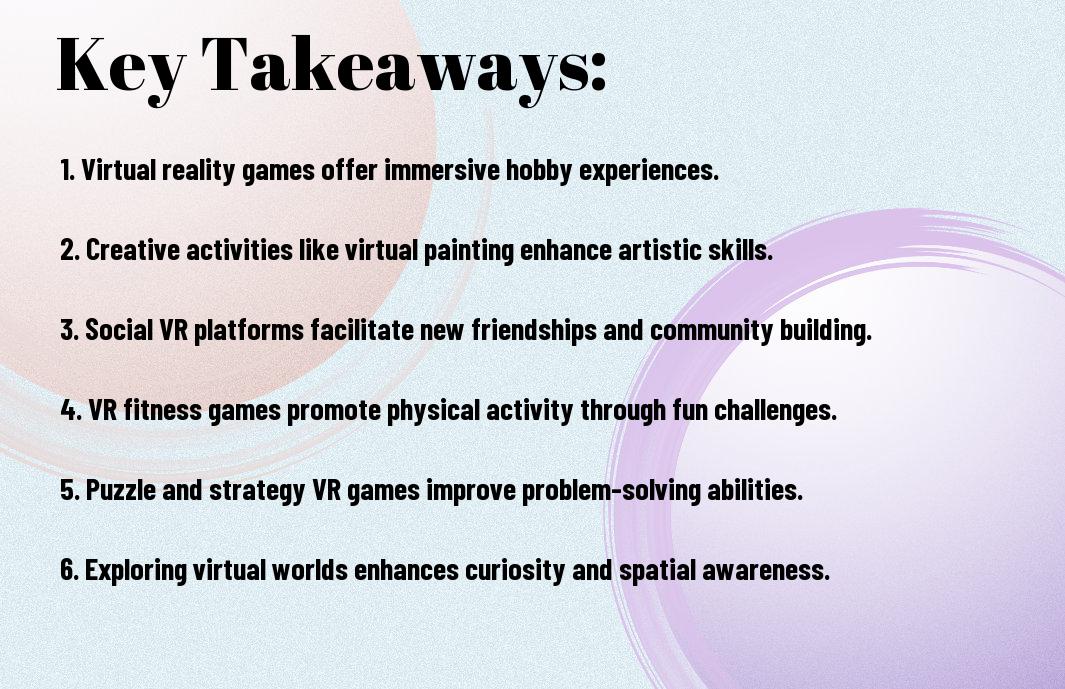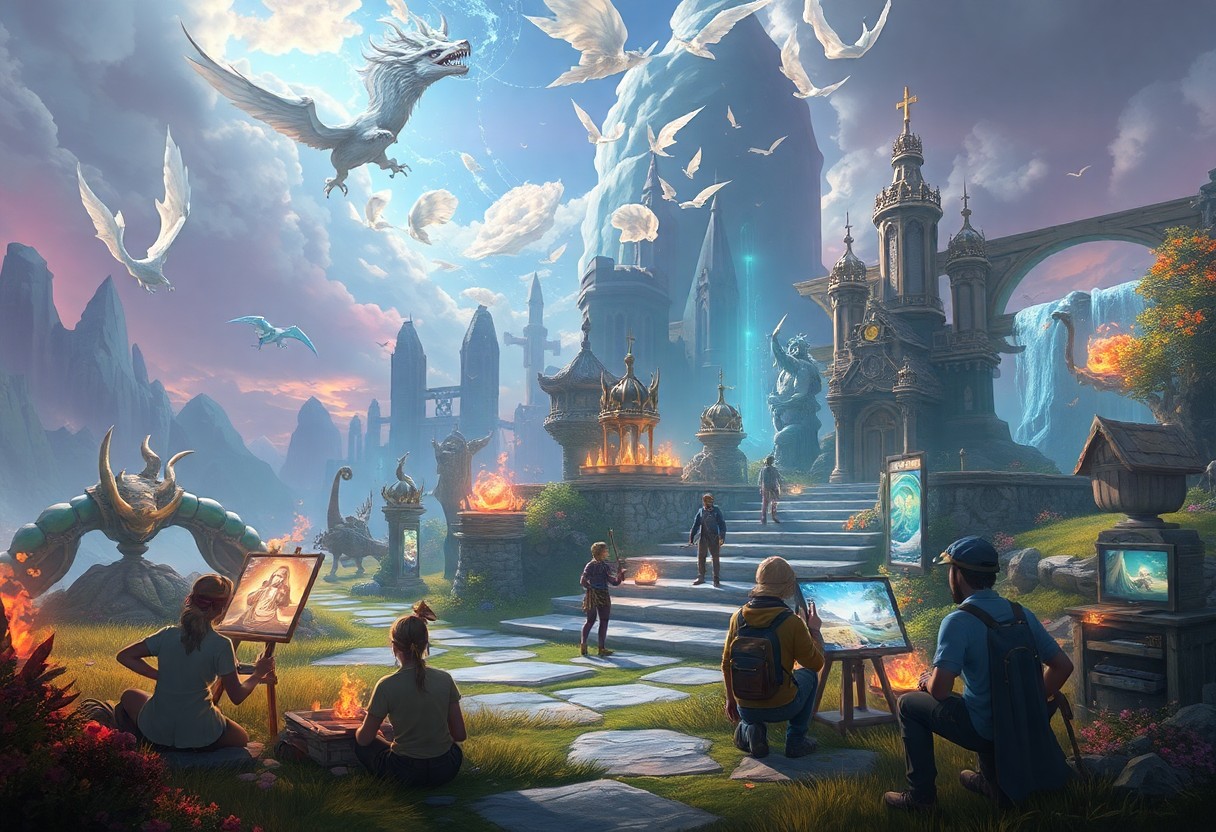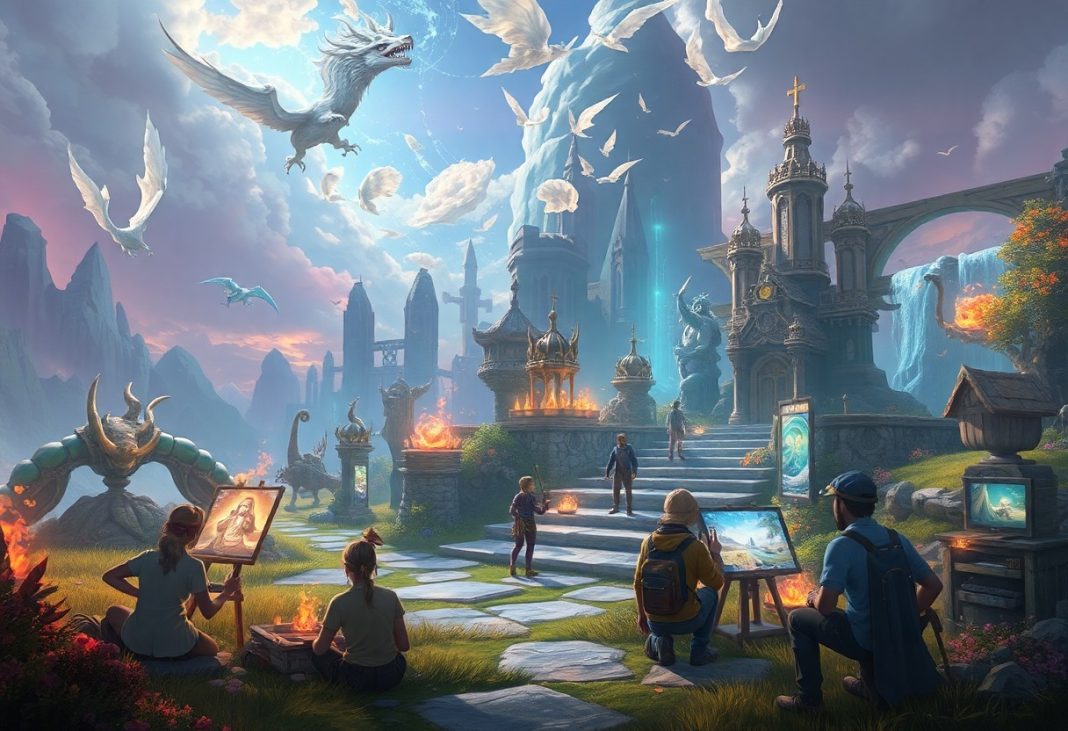There’s a growing world of digital hobbies waiting for you within the latest virtual reality games, offering immersive experiences that go beyond traditional gaming. As you examine these innovative platforms, you can engage in activities like virtual painting, music creation, or even social dancing, all designed to enrich your leisure time and expand your skills. Understanding what these digital pastimes entail helps you make the most of your VR experience, turning entertainment into a creative and fulfilling pursuit tailored to your interests and lifestyle.
Key Takeaways:
- Virtual reality games offer a diverse range of digital hobbies, from immersive storytelling and creative design to interactive fitness and social experiences.
- Exploring different VR genres can enhance skills such as problem-solving, hand-eye coordination, and teamwork while providing enjoyable entertainment.
- Engaging in VR hobbies fosters community building by connecting players with shared interests in vibrant virtual environments.

The Rise of Virtual Reality Games
Your journey into the world of digital hobbies is transforming with the rise of virtual reality games. These immersive experiences are reshaping how you engage with gaming, blending the physical and digital realms like never before. As VR technology becomes more accessible, you’re able to explore vast, interactive environments that respond to your movements and actions, creating more vivid and engaging gameplay. This new frontier not only enhances entertainment but also broadens the scope of social interaction, storytelling, and creativity within virtual spaces.
Overview of VR Technology
Between advanced headsets, motion sensors, and haptic feedback devices, VR technology creates fully immersive environments for your senses. These systems track your head and body movements in real time, allowing you to interact naturally within digital worlds. As the hardware evolves, you experience higher resolution displays, wider fields of view, and more comfortable designs, all contributing to deeper presence. This technological foundation supports diverse VR applications, making your virtual adventures more realistic and engaging than ever before.
Evolution of Gaming Experiences
After years of traditional screen-based gaming, VR offers you an entirely new dimension of interaction. Instead of passively observing, you actively participate by physically moving and manipulating virtual objects. This shift changes your role from spectator to explorer, adding depth to gameplay mechanics and narrative immersion. As games increasingly incorporate VR, you access novel challenges and creative expressions that redefine what gaming can be.
In addition to enhanced immersion, the evolution of gaming experiences in VR allows you to connect with others in shared virtual spaces, fostering a sense of presence and community. Multiplayer VR games enable cooperative strategies and social interactions that mimic real-world encounters, enriching your gaming beyond solo play. You also gain access to diverse genres tailored specifically for VR, from rhythm and puzzle games to expansive role-playing adventures, broadening your digital hobby horizons.
Popular Digital Hobbies in VR
Clearly, virtual reality has transformed how you engage with hobbies by immersing you in entirely new digital environments. From creative pursuits to social gatherings, VR offers a range of activities that make your experiences more interactive and engaging. These popular digital hobbies allow you to explore your interests in ways that blend entertainment with personal expression and community connection.
Virtual Art and Creativity
Beside traditional gaming, VR provides you with powerful tools to express your creativity through virtual art. You can paint in 3D spaces, sculpt digital objects, or design immersive worlds that reflect your imagination. This digital artistry hobby not only enhances your creative skills but also lets you share your creations with others in a visually dynamic and interactive format.
Social Interactions and Communities
After stepping into solo VR experiences, you can also discover vibrant social interactions and communities within virtual worlds. These platforms enable you to meet people with similar interests, attend events, and collaborate on projects, making your digital hobby a social one. Engaging in these communities enriches your VR experience beyond solitary play, building connections that enhance your enjoyment and learning.
Interactions in VR communities often mirror real-world social networks but with added layers of immersion and immediacy. You can use avatars to express yourself, participate in live discussions, join clubs or guilds, and attend virtual meetups. This fosters a sense of belonging and shared purpose where you not only pursue hobbies but also forge meaningful relationships and collaborations.
Fitness and Wellness in Virtual Environments
Not only are virtual reality games a source of entertainment, but they also offer innovative ways for you to engage in fitness and wellness activities. By integrating physical movement and mental relaxation into immersive environments, you can enhance your overall well-being without leaving your home. Virtual reality provides a unique platform where your fitness routines and mindfulness practices become more engaging and accessible.
VR Fitness Programs
Fitness in virtual reality is revolutionizing how you approach exercise, combining fun and effective workouts in immersive settings. Through VR fitness programs, you can participate in cardio sessions, strength training, and even dance workouts while tracking your progress in real time. These programs are designed to keep you motivated by offering interactive challenges and a variety of environments, making it easier to stay active and maintain your fitness goals.
Mindfulness and Meditation Applications
An increasing number of VR applications focus on mindfulness and meditation, allowing you to experience deep relaxation in calming virtual landscapes. These apps guide you through breathing exercises, body scans, and guided meditations that can reduce stress and improve mental clarity. By immersing yourself in these serene environments, you are able to enhance your mindfulness practice and bring balance to your daily routine.
Even with the increasing availability of VR mindfulness and meditation applications, the immersive quality truly sets them apart from traditional methods. You can feel transported to tranquil settings like forests, beaches, or zen gardens, which helps deepen your meditative state. The combination of visual and auditory cues in VR intensifies your sensory experience, aiding you in achieving relaxation and focus more effectively than conventional meditation techniques.

Educational Opportunities through VR
All virtual reality games offer more than just entertainment; they present incredible educational opportunities. By immersing yourself in interactive environments, you can gain knowledge and experiences that traditional methods may not provide. VR allows you to explore historical sites, conduct science experiments, and engage in complex problem-solving activities, making learning an exciting adventure. This technology adapts to your pace and style, transforming how you acquire skills and information in ways that feel natural and engaging.
Learning Platforms and Simulations
Among the most valuable educational tools in VR are specialized learning platforms and simulations. These environments let you practice real-world scenarios, such as medical procedures or engineering tasks, without risk. You can visualize complex concepts in 3D, making abstract ideas tangible and easier to grasp. These immersive platforms support your learning by providing instant feedback and adapting challenges to your skill level, enhancing retention and comprehension.
Skill Development and Workshops
Around VR games, there are numerous workshops and skill development sessions designed to help you master new abilities. These interactive workshops offer hands-on practice in areas like coding, painting, or even music production, guided by experts or AI tutors. You can join live virtual classes or self-paced modules, giving you flexibility and direct feedback to refine your techniques and accelerate your growth.
Further expanding on skill development, VR workshops also foster collaboration and networking among participants from around the globe. You can engage in group projects, share insights, and receive constructive critiques in a fully immersive setting. This communal aspect enriches your learning experience and motivates you to push your limits, making VR an effective platform for continuous personal and professional development.
Exploring New Genres in VR Gaming
Keep your VR experience fresh and exciting by exploring into new game genres that challenge and entertain you in unique ways. These innovations extend beyond traditional gaming, offering immersive stories, interactive environments, and gameplay that stimulate your creativity and problem-solving skills. Whether you seek adventure, mental challenges, or strategic thinking, VR provides a platform to explore your interests in diverse digital landscapes.
Adventure and Exploration Games
Beside the thrill of action, adventure and exploration games in VR invite you to traverse breathtaking virtual worlds where every step reveals new mysteries and narratives. You become the protagonist in your own story, discovering hidden secrets, solving environmental puzzles, and interacting with characters that enrich your journey, making each moment engaging and unforgettable.
Puzzle and Strategy Games
Along with immersive storytelling, VR puzzle and strategy games offer you stimulating challenges that hone your cognitive skills. These games engage your mind with intricate problems and tactical decisions, encouraging you to think critically while manipulating the three-dimensional virtual space for innovative solutions.
Understanding the depth of puzzle and strategy games in VR reveals how they push the boundaries of conventional gameplay. By integrating spatial reasoning and real-time strategic planning, these games require your active participation and adapt to your problem-solving style, making you an integral part of the evolving virtual challenges and enhancing the satisfaction of your achievements.
The Future of Digital Hobbies in VR
Despite the fast pace of technological advances, the future of digital hobbies in VR continues to evolve in exciting ways. You’ll find that VR offers increasingly immersive and interactive experiences, allowing you to engage in hobbies that were once limited to the real world. As hardware improves and software becomes more sophisticated, your digital leisure activities will only become richer, offering deeper creativity, social interaction, and personal growth opportunities.
Emerging Trends and Technologies
Trends in VR are pushing the boundaries of what digital hobbies can be. You’ll see integration of AI-driven content, haptic feedback devices that simulate touch, and more realistic avatars enhancing your immersion. These innovations mean your VR activities will become more personalized and responsive, creating virtual environments tailored precisely to your interests and skills, heightening engagement and satisfaction.
Community Engagement and Development
With the growth of VR, community engagement now plays a larger role in how you experience digital hobbies. You’ll have the chance to collaborate, compete, and socialize with people worldwide, creating a sense of belonging in virtual spaces. This development enriches your activities by fostering shared experiences, learning, and support within diverse VR communities.
Further expanding on community engagement, you’ll find many platforms are prioritizing user-driven content and social features. This empowers you to contribute creatively, form groups, and participate in events that shape the evolving digital culture. By actively joining these communities, your hobby becomes more dynamic and interactive, blending personal enjoyment with collective involvement.
Summing up
Following this exploration of digital hobbies within new virtual reality games, you gain insight into how diverse and engaging these experiences can be. Whether you enjoy creative expression, strategic challenges, or immersive storytelling, VR offers unique opportunities to deepen your hobbies in a virtual environment. By choosing the right games and platforms, you can personalize your digital pastime and enhance your skills while enjoying cutting-edge technologies. Embracing these options allows you to make the most of your time in virtual worlds, expanding your interests and connecting with like-minded communities.
FAQ
Q: What types of digital hobbies can I explore in new virtual reality games?
A: New virtual reality games offer a variety of digital hobbies, including immersive art creation, virtual gardening, interactive storytelling, and fitness activities. Players can engage in painting or sculpting in 3D spaces, cultivate and manage virtual plants or ecosystems, participate in role-playing scenarios with rich narratives, and experience exercise routines designed to be both fun and physically engaging within the VR environment.
Q: How can virtual reality games enhance social interaction within digital hobbies?
A: Virtual reality games enable users to connect and collaborate in shared digital spaces, making social interaction an integral part of many digital hobbies. Players can meet friends or join new communities to work on projects together, compete in friendly challenges, or attend virtual events and workshops. The immersive nature of VR helps create a sense of presence and personal connection that traditional screen-based platforms may lack, enriching the overall social experience.
Q: Are virtual reality digital hobbies suitable for beginners, or do they require prior experience with gaming or VR technology?
A: Most virtual reality games are designed to be accessible to users of all skill levels, including beginners. Many titles include tutorials and intuitive controls that help new players get comfortable with the VR environment and gameplay mechanics. Additionally, the diversity of digital hobbies allows individuals to choose activities that match their interests and comfort level, whether that’s simple creative tasks or more complex interactive experiences.





